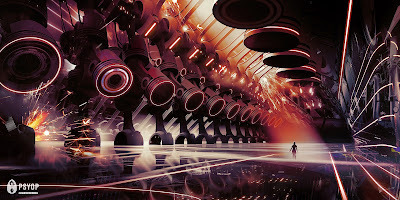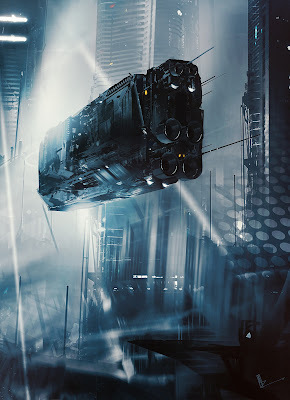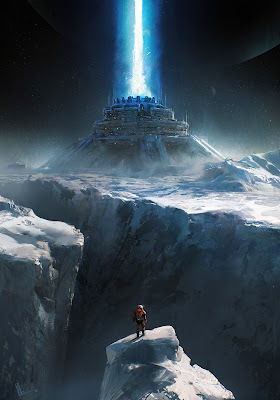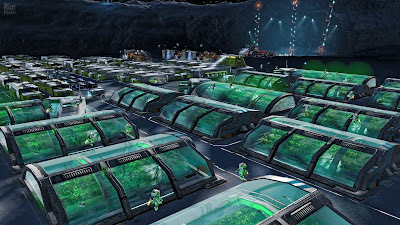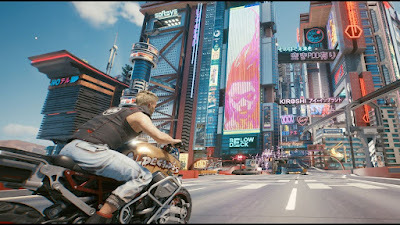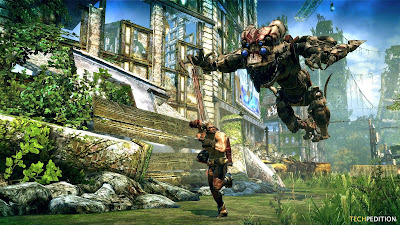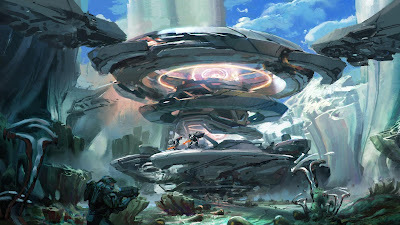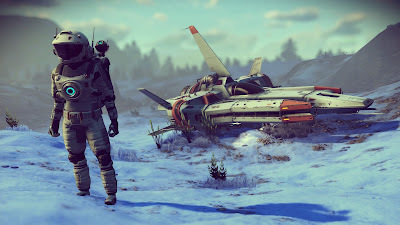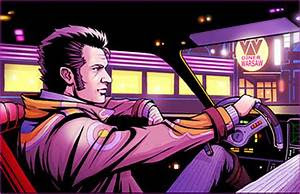Chris Morton's Blog, page 3
September 4, 2022
The Hunted Heroes by Robert Silverberg

The Hunted Heroes
by Robert Silverberg
"Let's keep moving," I told Val. "The surest way to die out here on Mars is to give up." I reached over and turned up the pressure on her oxymask to make things a little easier for her. Through the glassite of the mask, I could see her face contorted in an agony of fatigue.
And she probably thought the failure of the sandcat was all my fault, too. Val's usually about the best wife a guy could ask for, but when she wants to be she can be a real flying bother.
It was beyond her to see that some grease monkey back at the Dome was at fault – whoever it was who had failed to fasten down the engine hood. Nothing but what had stopped us _could_ stop a sandcat: sand in the delicate mechanism of the atomic engine.
But no; she blamed it all on me somehow: So we were out walking on the spongy sand of the Martian desert. We'd been walking a good eight hours.
"Can't we turn back now, Ron?" Val pleaded. "Maybe there isn't any uranium in this sector at all. I think we're crazy to keep on searching out here!"
I started to tell her that the UranCo chief had assured me we'd hit something out this way, but changed my mind. When Val's tired and overwrought there's no sense in arguing with her.
I stared ahead at the bleak, desolate wastes of the Martian landscape. Behind us somewhere was the comfort of the Dome, ahead nothing but the mazes and gullies of this dead world.
"Try to keep going, Val." My gloved hand reached out and clumsily enfolded hers. "Come on, kid. Remember – we're doing this for Earth. We're heroes."
She glared at me. "Heroes, hell!" she muttered. "That's the way it looked back home, but, out there it doesn't seem so glorious. And UranCo's pay is stinking."
"We didn't come out here for the pay, Val."
"I know, I know, but just the same –"
It must have been hell for her. We had wandered fruitlessly over the red sands all day, both of us listening for the clicks of the counter. And the geigers had been obstinately hushed all day, except for their constant undercurrent of meaningless noises.
Even though the Martian gravity was only a fraction of Earth's, I was starting to tire, and I knew it must have been really rough on Val with her lovely but unrugged legs.
"Heroes," she said bitterly. "We're not heroes--we're suckers! Why did I ever let you volunteer for the Geig Corps and drag me along?"
Which wasn't anywhere close to the truth. Now I knew she was at the breaking point, because Val didn't lie unless she was so exhausted she didn't know what she was doing. She had been just as much inflamed by the idea of coming to Mars to help in the search for uranium as I was. We knew the pay was poor, but we had felt it a sort of obligation, something we could do as individuals to keep the industries of radioactives-starved Earth going. And we'd always had a roving foot, both of us.
No, we had decided together to come to Mars – the way we decided together on everything. Now she was turning against me.
* * * * *
I tried to jolly her. "Buck up, kid," I said. I didn't dare turn up her oxy pressure any higher, but it was obvious she couldn't keep going. She was almost sleep-walking now.
We pressed on over the barren terrain. The geiger kept up a fairly steady click-pattern, but never broke into that sudden explosive tumult that meant we had found pay-dirt. I started to feel tired myself, terribly tired. I longed to lie down on the soft, spongy Martian sand and bury myself.
I looked at Val. She was dragging along with her eyes half-shut. I felt almost guilty for having dragged her out to Mars, until I recalled that I hadn't. In fact, she had come up with the idea before I did. I wished there was some way of turning the weary, bedraggled girl at my side back into the Val who had so enthusiastically suggested we join the Geigs.
Twelve steps later, I decided this was about as far as we could go.
I stopped, slipped out of the geiger harness, and lowered myself ponderously to the ground. "What'samatter, Ron?" Val asked sleepily. "Something wrong?"
"No, baby," I said, putting out a hand and taking hers. "I think we ought to rest a little before we go any further. It's been a long, hard day."
It didn't take much to persuade her. She slid down beside me, curled up, and in a moment she was fast asleep, sprawled out on the sands.
Poor kid, I thought. Maybe we shouldn't have come to Mars after all. But, I reminded myself, someonehad to do the job.
A second thought appeared, but I squelched it:
Why the hell me?
I looked down at Valerie's sleeping form, and thought of our warm, comfortable little home on Earth. It wasn't much, but people in love don't need very fancy surroundings.
I watched her, sleeping peacefully, a wayward lock of her soft blonde hair trailing down over one eyebrow, and it seemed hard to believe that we'd exchanged Earth and all it held for us for the raw, untamed struggle that was Mars. But I knew I'd do it again, if I had the chance. It's because we wanted to keep what we had. Heroes? Hell, no. We just liked our comforts, and wanted to keep them. Which took a little work.
* * * * *
Time to get moving.But then Val stirred and rolled over in her sleep, and I didn't have the heart to wake her. I sat there, holding her, staring out over the desert, watching the wind whip the sand up into weird shapes.
The Geig Corps preferred married couples, working in teams. That's what had finally decided it for us – we were a good team. We had no ties on Earth that couldn't be broken without much difficulty. So we volunteered.
And here we are.Heroes. The wind blasted a mass of sand into my face, and I felt it tinkle against the oxymask.
I glanced at the suit-chronometer. Getting late. I decided once again to wake Val. But she was tired. And I was tired too, tired from our wearying journey across the empty desert.
I started to shake Val. But I never finished. It would be sonice just to lean back and nuzzle up to her, down in the sand. So nice. I yawned, and stretched back.
* * * * *
I awoke with a sudden startled shiver, and realized angrily I had let myself doze off. "Come on, Val," I said savagely, and started to rise to my feet.
I couldn't.
I looked down. I was neatly bound in thin, tough, plastic tangle-cord, swathed from chin to boot-bottoms, my arms imprisoned, my feet caught. And tangle-cord is about as easy to get out of as a spider's web is for a trapped fly.
It wasn't Martians that had done it. There weren't any Martians, hadn't been for a million years. It was some Earthman who had bound us.
I rolled my eyes toward Val, and saw that she was similarly trussed in the sticky stuff. The tangle-cord was still fresh, giving off a faint, repugnant odor like that of drying fish. It had been spun on us only a short time ago, I realized.
"Ron –"
"Don't try to move, baby. This stuff can break your neck if you twist it wrong." She continued for a moment to struggle futilely, and I had to snap, "Lie still, Val!"
"A very wise statement," said a brittle, harsh voice from above me. I looked up and saw a helmeted figure above us. He wasn't wearing the customary skin-tight pliable oxysuits we had. He wore an outmoded, bulky spacesuit and a fishbowl helmet, all but the face area opaque. The oxygen cannisters weren't attached to his back as expected, though. They were strapped to the back of the wheelchair in which he sat.
Through the fishbowl I could see hard little eyes, a yellowed, parchment-like face, a grim-set jaw. I didn't recognize him, and this struck me odd. I thought I knew everyone on sparsely-settled Mars. Somehow I'd missed him.
What shocked me most was that he had no legs. The spacesuit ended neatly at the thighs.
He was holding in his left hand the tanglegun with which he had entrapped us, and a very efficient-looking blaster was in his right.
"I didn't want to disturb your sleep," he said coldly. "So I've been waiting here for you to wake up."
I could just see it. He might have been sitting there for hours, complacently waiting to see how we'd wake up. That was when I realized he must be totally insane. I could feel my stomach-muscles tighten, my throat constrict painfully.
Then anger ripped through me, washing away the terror. "What's going on?" I demanded, staring at the half of a man who confronted us from the wheelchair. "Who are you?"
"You'll find out soon enough," he said. "Suppose now you come with me." He reached for the tanglegun, flipped the little switch on its side to MELT, and shot a stream of watery fluid over our legs, keeping the blaster trained on us all the while. Our legs were free.
"You may get up now," he said. "Slowly, without trying to make trouble." Val and I helped each other to our feet as best we could, considering our arms were still tightly bound against the sides of our oxysuits.
"Walk," the stranger said, waving the tanglegun to indicate the direction. "I'll be right behind you." He holstered the tanglegun.
I glimpsed the bulk of an outboard atomic rigging behind him, strapped to the back of the wheelchair. He fingered a knob on the arm of the chair and the two exhaust ducts behind the wheel-housings flamed for a moment, and the chair began to roll.
Obediently, we started walking. You don't argue with a blaster, even if the man pointing it is in a wheelchair.
* * * * *
"What's going on, Ron?" Val asked in a low voice as we walked. Behind us the wheelchair hissed steadily.
"I don't quite know, Val. I've never seen this guy before, and I thought I knew everyone at the Dome."
"Quiet up there!" our captor called, and we stopped talking. We trudged along together, with him following behind; I could hear the crunch-crunchof the wheelchair as its wheels chewed into the sand. I wondered where we were going, and why. I wondered why we had ever left Earth.
The answer to that came to me quick enough: we had to. Earth needed radioactives, and the only way to get them was to get out and look. The great atomic wars of the late 20th Century had used up much of the supply, but the amount used to blow up half the great cities of the world hardly compared with the amount we needed to put them back together again.
In three centuries the shattered world had been completely rebuilt. The wreckage of New York and Shanghai and London and all the other ruined cities had been hidden by a shining new world of gleaming towers and flying roadways. We had profited by our grandparents' mistakes. They had used their atomics to make bombs. We used ours for fuel.
It was an atomic world. Everything: power drills, printing presses, typewriters, can openers, ocean liners, powered by the inexhaustible energy of the dividing atom.
But though the energy is inexhaustible, the supply of nuclei isn't.
After three centuries of heavy consumption, the supply failed. The mighty machine that was Earth's industry had started to slow down.
And that started the chain of events that led Val and me to end up as a madman's prisoners, on Mars. With every source of uranium mined dry on Earth, we had tried other possibilities. All sorts of schemes came forth. Project Sea-Dredge was trying to get uranium from the oceans. In forty or fifty years, they'd get some results, we hoped. But there wasn't forty or fifty years' worth of raw stuff to tide us over until then. In a decade or so, our power would be just about gone. I could picture the sort of dog-eat-dog world we'd revert back to. Millions of starving, freezing humans tooth-and-clawing in it in the useless shell of a great atomic civilization.
So, Mars. There's not much uranium on Mars, and it's not easy to find or any cinch to mine. But what little is there, helps. It's a stopgap effort, just to keep things moving until Project Sea-Dredge starts functioning.
Enter the Geig Corps: volunteers out on the face of Mars, combing for its uranium deposits.
And here we are, I thought.
* * * * *
After we walked on a while, a Dome became visible up ahead. It slid up over the crest of a hill, set back between two hummocks on the desert. Just out of the way enough to escape observation.
For a puzzled moment I thought it was our Dome, the settlement where all of UranCo's Geig Corps were located, but another look told me that this was actually quite near us and fairly small. A one-man Dome, of all things!
"Welcome to my home," he said. "The name is Gregory Ledman." He herded us off to one side of the airlock, uttered a few words keyed to his voice, and motioned us inside when the door slid up. When we were inside he reached up, clumsily holding the blaster, and unscrewed the ancient spacesuit fishbowl.
His face was a bitter, dried-up mask. He was a man who hated.
The place was spartanly furnished. No chairs, no tape-player, no decoration of any sort. Hard bulkhead walls, rivet-studded, glared back at us. He had an automatic chef, a bed, and a writing-desk, and no other furniture.
Suddenly he drew the tanglegun and sprayed our legs again. We toppled heavily to the floor. I looked up angrily.
* * * * *
"I imagine you want to know the whole story," he said. "The others did, too."
Valerie looked at me anxiously. Her pretty face was a dead white behind her oxymask. "What others?"
"I never bothered to find out their names," Ledman said casually. "They were other Geigs I caught unawares, like you, out on the desert. That's the only sport I have left – Geig-hunting. Look out there."
He gestured through the translucent skin of the Dome, and I felt sick. There was a little heap of bones lying there, looking oddly bright against the redness of the sands. They were the dried, parched skeletons of Earthmen. Bits of cloth and plastic, once oxymasks and suits, still clung to them.
Suddenly I remembered. There had been a pattern there all the time. We didn't much talk about it; we chalked it off as occupational hazards. There had been a pattern of disappearances on the desert. I could think of six, eight names now. None of them had been particularly close friends. You don't get time to make close friends out here. But we'd vowed it wouldn't happen to us.
It had.
"You've been hunting Geigs?" I asked. "Why?What've they ever done to you?"
He smiled, as calmly as if I'd just praised his house-keeping. "Because I hate you," he said blandly. "I intend to wipe every last one of you out, one by one."
I stared at him. I'd never seen a man like this before; I thought all his kind had died at the time of the atomic wars.
I heard Val sob, "He's a madman!"
"No," Ledman said evenly. "I'm quite sane, believe me. But I'm determined to drive the Geigs--and UranCo--off Mars. Eventually I'll scare you all away."
"Just pick us off in the desert?"
"Exactly," replied Ledman. "And I have no fears of an armed attack. This place is well fortified. I've devoted years to building it. And I'm back against those hills. They couldn't pry me out." He let his pale hand run up into his gnarled hair. "I've devoted years to this. Ever since – ever since I landed here on Mars."
* * * * *
"What are you going to do with us?" Val finally asked, after a long silence.
He didn't smile this time. "Kill you," he told her. "Not your husband. I want him as an envoy, to go back and tell the others to clear off." He rocked back and forth in his wheelchair, toying with the gleaming, deadly blaster in his hand.
We stared in horror. It was a nightmare – sitting there, placidly rocking back and forth, a nightmare.
I found myself fervently wishing I was back out there on the infinitely safer desert.
"Do I shock you?" he asked. "I shouldn't--not when you see my motives."
"We don't see them," I snapped.
"Well, let me show you. You're on Mars hunting uranium, right? To mine and ship the radioactives back to Earth to keep the atomic engines going. Right?"
I nodded over at our geiger counters.
"We volunteered to come to Mars," Val said irrelevantly.
"Ah – two young heroes," Ledman said acidly. "How sad. I could almost feel sorry for you. Almost."
"Just what is it you're after?" I said, stalling, stalling.
"Atomics cost me my legs," he said. "You remember the Sadlerville Blast?" he asked.
"Of course." And I did, too. I'd never forget it. No one would. How could I forget that great accident--killing hundreds, injuring thousands more, sterilizing forty miles of Mississippi land--when the Sadlerville pile went up?
"I was there on business at the time," Ledman said. "I represented Ledman Atomics. I was there to sign a new contract for my company. You know who I am, now?"
I nodded.
"I was fairly well shielded when it happened. I never got the contract, but I got a good dose of radiation instead. Not enough to kill me," he said. "Just enough to necessitate the removal of –" he indicated the empty space at his thighs. "So I got off lightly." He gestured at the wheelchair blanket.
I still didn't understand. "But why kill us Geigs? Wehad nothing to do with it."
"You're just in this by accident," he said. "You see, after the explosion and the amputation, my fellow-members on the board of Ledman Atomics decided that a semi-basket case like myself was a poor risk as Head of the Board, and they took my company away. All quite legal, I assure you. They left me almost a pauper!" Then he snapped the punchline at me.
"They renamed Ledman Atomics. Who did you say you worked for?"
I began, "Uran–"
"Don't bother. A more inventive title than Ledman Atomics, but not quite as much heart, wouldn't you say?" He grinned. "I saved for years; then I came to Mars, lost myself, built this Dome, and swore to get even. There's not a great deal of uranium on this planet, but enough to keep me in a style to which, unfortunately, I'm no longer accustomed."
* * * * *
He consulted his wrist watch. "Time for my injection." He pulled out the tanglegun and sprayed us again, just to make doubly certain. "That's another little souvenir of Sadlerville. I'm short on red blood corpuscles."
He rolled over to a wall table and fumbled in a container among a pile of hypodermics. "There are other injections, too. Adrenalin, insulin. Others. The Blast turned me into a walking pin-cushion. But I'll pay it all back," he said. He plunged the needle into his arm.
My eyes widened. It was too nightmarish to be real. I wasn't seriously worried about his threat to wipe out the entire Geig Corps, since it was unlikely that one man in a wheelchair could pick us all off. No, it wasn't the threat that disturbed me, so much as the whole concept, so strange to me, that the human mind could be as warped and twisted as Ledman's.
I saw the horror on Val's face, and I knew she felt the same way I did.
"Do you really think you can succeed?" I taunted him. "Really think you can kill every Earthman on Mars? Of all the insane, cockeyed –"
Val's quick, worried head-shake cut me off. But Ledman had felt my words, all right.
"Yes! I'll get even with every one of you for taking away my legs! If we hadn't meddled with the atom in the first place, I'd be as tall and powerful as you, today – instead of a useless cripple in a wheelchair."
"You're sick, Gregory Ledman," Val said quietly. "You've conceived an impossible scheme of revenge and now you're taking it out on innocent people who've done nothing, nothing at all to you. That's not sane!"
His eyes blazed. "Who are you to talk of sanity?"
* * * * *
Uneasily I caught Val's glance from a corner of my eye. Sweat was rolling down her smooth forehead faster than the auto-wiper could swab it away.
"Why don't you do something? What are you waiting for, Ron?"
"Easy, baby," I said. I knew what our ace in the hole was. But I had to get Ledman within reach of me first.
"Enough," he said. "I'm going to turn you loose outside, right after –"
"Get sick!" I hissed to Val, low. She began immediately to cough violently, emitting harsh, choking sobs. "Can't breathe!" She began to yell, writhing in her bonds.
That did it. Ledman hadn't much humanity left in him, but there was a little. He lowered the blaster a bit and wheeled one-hand over to see what was wrong with Val. She continued to retch and moan most horribly. It almost convinced me. I saw Val's pale, frightened face turn to me.
He approached and peered down at her. He opened his mouth to say something, and at that moment I snapped my leg up hard, tearing the tangle-cord with a snicking rasp, and kicked his wheelchair over.
The blaster went off, burning a hole through the Dome roof. The automatic sealers glued-in instantly. Ledman went sprawling helplessly out into the middle of the floor, the wheelchair upended next to him, its wheels slowly revolving in the air. The blaster flew from his hands at the impact of landing and spun out near me. In one quick motion I rolled over and covered it with my body.
* * * * *
Ledman clawed his way to me with tremendous effort and tried wildly to pry the blaster out from under me, but without success. I twisted a bit, reached out with my free leg, and booted him across the floor. He fetched up against the wall of the Dome and lay there.
Val rolled over to me.
"Now if I could get free of this stuff," I said, "I could get him covered before he comes to. But how?"
"Teamwork," Val said. She swivelled around on the floor until her head was near my boot. "Push my oxymask off with your foot, if you can."
I searched for the clamp and tried to flip it. No luck, with my heavy, clumsy boot. I tried again, and this time it snapped open. I got the tip of my boot in and pried upward. The oxymask came off, slowly, scraping a jagged red scratch up the side of Val's neck as it came.
"There," she breathed. "That's that."
I looked uneasily at Ledman. He was groaning and beginning to stir.
Val rolled on the floor and her face lay near my right arm. I saw what she had in mind. She began to nibble the vile-tasting tangle-cord, running her teeth up and down it until it started to give. She continued unfailingly.
Finally one strand snapped. Then another. At last I had enough use of my hand to reach out and grasp the blaster. Then I pulled myself across the floor to Ledman, removed the tanglegun, and melted the remaining tangle-cord off.
My muscles were stiff and bunched, and rising made me wince. I turned and freed Val. Then I turned and faced Ledman.
"I suppose you'll kill me now," he said.
"No. That's the difference between sane people and insane," I told him. "I'm not going to kill you at all. I'm going to see to it that you're sent back to Earth."
"No!" he shouted. "No! Anything but back there. I don't want to face them again – not after what they did to me –"
"Not so loud," I broke in. "They'll help you on Earth. They'll take all the hatred and sickness out of you, and turn you into a useful member of society again."
"I hate Earthmen," he spat out. "I hate all of them."
"I know," I said sarcastically. "You're just all full of hate. You hated us so much that you couldn't bear to hang around on Earth for as much as a year after the Sadlerville Blast. You had to take right off for Mars without a moment's delay, didn't you? You hated Earth so much you had to leave."
"Why are you telling all this to me?"
"Because if you'd stayed long enough, you'd have used some of your pension money to buy yourself a pair of prosthetic legs, and then you wouldn't need this wheelchair."
Ledman scowled, and then his face went belligerent again. "They told me I was paralyzed below the waist. That I'd never walk again, even with prosthetic legs, because I had no muscles to fit them to."
"You left Earth too quickly," Val said.
"It was the only way," he protested. "I had to get off –"
"She's right," I told him. "The atom can take away, but it can give as well. Soon after you left they developed atomic-poweredprosthetics – amazing things, virtually robot legs. All the survivors of the Sadlerville Blast were given the necessary replacement limbs free of charge. All except you. You were so sick you had to get away from the world you despised and come here."
"You're lying," he said. "It's not true!"
"Oh, but it is," Val smiled.
I saw him wilt visibly, and for a moment I almost felt sorry for him, a pathetic legless figure propped up against the wall of the Dome at blaster-point. But then I remembered he'd killed twelve Geigs – or more – and would have added Val to the number had he had the chance.
* * * * *
"You're a very sick man, Ledman," I said. "All this time you could have been happy, useful on Earth, instead of being holed up here nursing your hatred. You might have been useful, on Earth. But you decided to channel everything out as revenge."
"I still don't believe it – those legs. I might have walked again. No – no, it's all a lie. They told me I'd never walk," he said, weakly but stubbornly still.
I could see his whole structure of hate starting to topple, and
decided to give it the final push.
"Haven't you wondered how I managed to break the tangle-cord when I kicked you over?"
"Yes – human legs aren't strong enough to break tangle-cord that way."
"Of course not," I said. I gave Val the blaster and slipped out of my oxysuit. "Look," I said. I pointed to my smooth, gleaming metal legs. The almost soundless purr of their motors was the only noise in the room. "I was in the Sadlerville Blast, too," I said. "But I didn't go crazy with hate when I lost mylegs."
Ledman was sobbing.
"Okay, Ledman," I said. Val got him into his suit, and brought him the fishbowl helmet. "Get your helmet on and let's go. Between the psychs and the prosthetics men, you'll be a new man inside of a year."
"But I'm a murderer!"
"That's right. And you'll be sentenced to psych adjustment. When they're finished, Gregory Ledman the killer will be as dead as if they'd electrocuted you, but there'll be a new--and sane--Gregory Ledman." I turned to Val.
"Got the geigers, honey?"
For the first time since Ledman had caught us, I remembered how tired Val had been out on the desert. I realized now that I had been driving her mercilessly – me, with my chromium legs and atomic-powered muscles. No wonder she was ready to fold! And I'd been too dense to see how unfair I had been.
She lifted the geiger harnesses, and I put Ledman back in his wheelchair.
Val slipped her oxymask back on and fastened it shut.
"Let's get back to the Dome in a hurry," I said. "We'll turn Ledman over to the authorities. Then we can catch the next ship for Earth."
"Go back? Go back?If you think I'm backing down now and quitting you can find yourself another wife! After we dump this guy I'm sacking in for twenty hours, and then we're going back out there to finish that search-pattern. Earth needs uranium, honey, and I know you'd never be happy quitting in the middle like that." She smiled. "I can't wait to get out there and start listening for those tell-tale clicks."
I gave a joyful whoop and swung her around. When I put her down, she squeezed my hand, hard.
"Let's get moving, fellow hero," she said.
I pressed the stud for the airlock, smiling.
Robert Silverberg is one of the masters of sci-fi. If you are unfamiliar with his work, check out the amazon page here and his Wikipedia page here .
For an interview with Rober Silverberg click here
This story is taken from Project Gutenberg . The etext was produced from Amazing Stories September 1956. For legal reasons the following statement must be included: ( This eBook is for the use of anyone anywhere at no cost and with almost no restrictions whatsoever. You may copy it, give it away or re-use it under the terms of the Project Gutenberg License included with this eBook or online at www.gutenberg.org).
September 3, 2022
Bookspot - All That's Left by K. A. Allen
Bookspot - All That's Left by K. A. Allen
When you're all that's left, who can you count on?
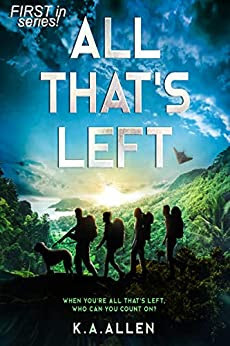
I’m Jessica (Doc) and this is my story of how our small group of people tried to survive when the aliens began the extermination of our species. Our only escape from the relentless bombing was into the tropical rainforest, but it is a much harsher place to live than you’d think and without medical care, it can be as deadly as any environment on earth. I was a third-year pharmacy student, what did I know about being a doctor? Nothing really, but I was the closest thing we had, so I had to learn fast.
We all did that, found a need and became that person. Jared, an ex-army reservist became our leader, and it was his idea that started us on the epic 150km trek through the rainforest that would ultimately either save our lives... Or break us beyond repair.
We became a family, and live or die, at least we had each other…
This is the debut novel and first in series of Australian author K A Allen. A unique story of survival and friendship in the face of an alien invasion. It is told in first-person and suits all audiences who appreciate a fast-paced read with a plot that doesn’t give up.
August 19, 2022
Art - Sin Jong Hun
Art - Sin Jong Hun

Galaxy Work Room

Time And Space
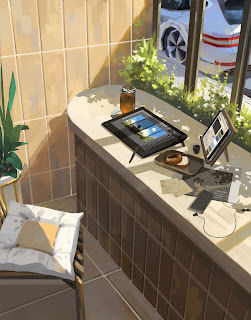
Cafe

Travel
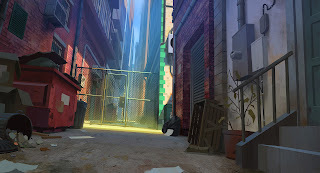
Daily Sketch (Untitled)

Pastel Sunset
You can check out more from Sin Jong Hun by clicking here, here, or here.
August 16, 2022
The Syphon

Dating
by Chris Morton
Four days into the voyage you will notice a change in the crew. Each of the other ten will have heard the Syphon’s call by then, and will have made their visits to its chamber.
None will form an official report of their private meetings with the Syphon. They will record no log entries. Already there will be a growing sense of paranoia among the group.
Lilly Clark, the ship’s assistant engineer, will be the first to be affected. She has never experienced love of any kind, so she is the most susceptible. Abandoned at birth, no lasting relationships and still a virgin; to say she is unsuitable for this mission would be an understatement.
We approximate that five or six days in she will make an attempt to lock herself in with the Syphon. The crew, too preoccupied with their own feelings, will fail to notice her mental instability in time to stop this. She will shut herself in its pod; the pod within the room that will be referred to as its chamber. And with her knowledge of the ship’s computer, she will be able to temporarily override any efforts to break her out.
She will die from asphyxiation. After a few hours together with the Syphon, the choice she must make will soon become clear. Even with her advanced expertise of the ships systems and security, the crew will succeed in breaking her out eventually. Faced with the cold realisation that she will never be this close to the Syphon again, Clark will make the choice: to die together rather than live apart. She will drain the air from the pod but the Syphon will survive.
*
Lilly Clark will receive an official space ‘burial.’ There will be a memorial service aboard the ship the day after her death, and her body will be ejected into space.
The morale on board the ship will have dropped somewhat after this first death. That much goes without saying. But there is a reason for memorial services being conducted while still on mission, and there is purpose in the disposal of corpses.
The crew will move on quickly. This mission is for the Syphon to reach its homeworld, and they are officers, professionals who answer to the call of duty.
As the ship’s doctor, you will inform the crew that Lilly Clark suffered from insanity related to spacesickness. We have assessed that quite surprisingly, her death will play its part in diluting their paranoia somewhat. They will mourn, they will talk of her good qualities; what a fine officer she was; what a kind, honest woman.
/
First Officer Jackal will suggest that Jefferies, the Chief Engineer, take over all of Lilly Clark’s responsibilities, but Captain Robinson will intervene, assigning her duties to First Pilot Ledger, who will make a pretence of this task being a huge favour to everyone, despite the fact that he has been looking to expand his portfolio for a number of years now. Robinson knows this. He and Ledger go back a long way and he is fully aware of Ledger’s aspirations to one day make captain.
The crew will be satisfied. Ledger is a popular character, a joker who never fails to entertain his crewmates with friendly banter. He shares morale duties with Second Pilot ABC (a nom de guerre she prefers to go by) even though she is the more qualified of the two: the specialist in psychology who will eventually lead the vessel – you may be surprised to hear that the next person to die will in fact be the captain himself.
There will, however be a number of weeks before the actions of the captain become a cause for concern.
Michael Robinson
Of all the deaths, this is one of only two for which you must have influence.
Captain Robinson is an intelligent human being. Of course the same can be said for all the crew, but in contrast to them he has more life experience – he is fifty-five, the oldest and the highest of rank; married three times, divorced three times. Despite his rather bulky and at times dishevelled appearance, he has a reputation as a man with a gift for the ladies. He has a good family background. He knows love, and his heart is pure. Although he can be bad-tempered at times, his emotions are perfectly balanced. He is the most confident, he knows who he is, never questions himself, and do not misinterpret his bad temper for anything other than an openness of spirit.
The captain will put the crew above the mission – he cares nothing for the Syphon, he is no fool, and he will be the first, the only member strong enough to reject the Syphon’s call, breaking the bond; divorcing himself from its influence.
By then, when he realises the hold it has over the others, he will not attempt to share this discovery. He is intelligent enough to recognise a crew that is beyond convincing; so in his nobility, his duty, the captain will take it upon himself to destroy the Syphon for the good of you all.
He will go to its chamber, you must watch him, follow him when he does so because if you do not stop him, he will kill it. He will break into its pod and burn its body with laser, destroying it completely; he has the strength to ignore its pleading. It will call out to the others, and they will arrive soon enough to witness its death.
You must stop him before any of this happens. You must watch him, follow him, and when he finally decides to go through with his plan, you must kill the captain. Your task is to see this mission completed, to see the safe arrival of the Syphon. We have made the necessary overrides to your programming; we have interfered with your systems to allow you to kill Robinson and one other.
Use his pistol, he will be carrying it. Kill him in the chamber and make it look like suicide.
When the crew find him having gone the same way as Lilly Clark, they will link the deaths together. Two suicides.
There will be a thorough investigation – not only by yourself; Jackal, now in charge will order the food to be tested, the air content and pressure – but nothing will be found to connect the apparent psychological disorders of your two dead colleagues.
The crew will admit nothing of their own neurosis and paranoia; even ABC, the strongest crewmate left will as yet be unsuspicious. She will blame herself for her imbalance of mind. She is susceptible to depression and will be attending her second funeral in as many months. She will self-medicate with vicodin, she will put on a brave face.
Melissa Hagen
Melissa Hagen and Abigail Beatrice Collins were in the same year at the Paris Space Academy, rooming together for the first of their six-year induction. Each admitted to having been in a relationship with the other, and by that I mean of an intimate and sexual nature that was, quote: ‘Ancient history,’ (interviewed separately, each used this exact term.)
We have assessed ABC to still be holding some feelings for her former roommate; feelings which do not lie so strong within Pilot Hagen. Rather, with Pilot Hagen there is blocked emotion masked by an overemphasis on professionalism towards her now senior officer. There is a bitterness too, which will flare up in time. Because of this rather unfortunate complication – it was enough effort just getting you on board, let alone being allowed involvement in choosing the rest of the crew – we can predict Pilot Hagen as being the next unfortunate victim of circumstances.
With Captain Robinson now deceased, First Officer Jackal will now assume command, passing on his own rank to Chief Engineer Jefferies. Jackal and Jefferies will discuss together the possibility of another disaster occurring on mission; checks on the food and air composition; diagnoses on all the ship’s systems; plus security will be upped – yourself and Sergeant Suarez will share around the clock guard duty of the chamber. (As a synthetic, you will not be affected by this added exposure. Sergeant Suarez is simple minded and there will be no need to worry about her for the time being.)
Focus your attention instead on Hagen, for soon she will be showing the effects of psychosis. Her love for the Syphon will at first mimic the love she has for her husband back on Earth; then, as it becomes stronger, she will become confused, irrational. She will accuse ABC of becoming jealous of her love for another. She will say she is dangerous, accusing her in front of the others of plotting to kill the Syphon.
There will be no need to step in. The other crew members will recognise the mental imbalance in Hagen’s words. In spite of their own feelings for the Syphon, they will see these erratic accusations for what they are. If you step in, you will arouse suspicion over your role in this mission. Stay in the background, allow things to develop.
After some discussion, Pilot Hagen will be put in the brig for her own safety. Orders of Acting Captain Jackal.
Hagen will refuse food, scream herself to exhaustion on a daily basis, begging and pleading to be allowed just one more visit to the Syphon’s chamber. Attempts at counselling her back into sanity will soon be given up on. She will be drugged (for which, as the ship’s doctor, you will diagnose the need for), avoided, and almost forgotten. She will, however, be one of the few to survive the mission.
Hal Jefferies
Jackal and Jefferies will be strongly suspicious of the Syphon by then. The two of them will often be found in the conference room, behind closed doors, not including the rest of you in their discussions; thus arousing suspicion over their intentions and a further separation between themselves and the rest of the crew. Acting Captain Jackal will be referred to simply as ‘Jackal’ behind his back, with no respect for his rank. Jackal and Jefferies – it is likely they will be given nicknames too, though what exactly those will be, we cannot predict.
What we do know is that by this time Captain Jackal will be the most intelligent person on board, closely followed by Science Officer Strickland and ABC.
It is only a matter of time before he comes to the same conclusion as Robinson: that the Syphon has to go, for the good of the crew. He will hesitate in revealing this to Jefferies, for by then Jefferies will be showing signs of passive aggressiveness, questioning the acting captain over every decision.
To keep the crew busy, it will be Jackal’s idea to install a strict routine of health food and exercise – mental health will be his official reason; a healthy body, a healthy mind. His real reason, however, will be to keep the crew away from the Syphon. He will order them to use the virtual entertainment available on the ship, including this as part of their daily schedule; making it protocol; keeping them busy.
Jefferies will try to be a go-between, feigning camaraderie with the crew, raising his eyes at each new idea Jackal has come up with to keep them occupied. He will be respected less for this. And soon you will see him losing his temper more often. Jefferies is suitably married to a woman of more dominant character. While with her she offers him balance; while away from her on mission he revels in responsibility, throwing himself into his work. But with these new feelings for the Syphon, he is beginning to lose touch; guilt battling with euphoria – a new lease of life, though similar to an adolescent, he will by then be a soup of emotion.
Communications Officer Berlin will be the only crewmate to show sympathy for Jefferies’ increasingly dangerous condition. He will make an appeal to ABC and Ledger to take responsibility in their morale duties, to refrain from shunning their crewmate and friend. This will, however, be to no avail – the health and well-being of both Jefferies and Jackal will bear no importance to the rest of the crew. For Berlin also, this empathy towards his one time friend will be short-lived.
Even Acting Captain Jackal, in spite of his growing understanding of the hold the Syphon has over the crew, will fail to notice in time that Jefferies, the one closest to him, is in fact losing his mind.
We predict it to be around the fourteenth week when Jefferies will eject himself from the ship. Psychological reports for the man flag up numerous references to this method of suicide in response to hypothetical scenarios: in one report he even stated it as being a dream of his, ‘to go that way.’
You will be the first to spot his body floating away through the window, for you will be watching for this, observing his every move and ready – nevertheless, so as not to elicit suspicion, you must find a way of moving Berlin to the observation lounge in time to witness Jefferies’ unfortunate space flight.
Be careful to provide a natural reason for bringing about this witnessing. With only seven active crew members left and an ever increasing state of paranoia, this may be difficult, but you must do all you can. Remember your mission; by then the Syphon will be over halfway home.
John Strickland
John Strickland, the science officer and expert in linguistics will be the next to die. By then he will have begun his attempt at interpreting the Syphon’s call. You may wish to observe the scribblings in his room – on the bathroom wall, we predict, etched in coloured ink. (He will also have a sizeable pad of paper notes that we would like you to get hold of at some point, though there will be no hurry for this. Just make sure you have secured it for our easy access by the time the mission is completed.)
After the death of Jefferies, the crew will understand that in all likelihood another one of them will be next. However, although suspicion and paranoia will be at the forefront of everyone’s minds, the funeral performed will temporarily bring you together. As a seven, you will for the first time fully accept that fate may be beyond all of your control.
Still no crew member will reveal their connection with the Syphon, although the idea may arise that each is not the only one to be hearing the Syphon’s call – a suspicion unrelated to the three deaths on board; rather, it will be a suspicion that they may have rivals when it comes to the Syphon’s love; and it is this suspicion that will ultimately mask any fear of danger from their colleagues. They will see each other as rivals, not possible murderers. And above all else, their primary care (Jackal aside) will be for the protection of the Syphon.
What will follow will be a short spell of apparent camaraderie, of politeness, which will ironically from the outside appear as a quite peaceful period of the voyage. Inside, however, and especially when alone at night, the crew will be wrestling with a number of personal demons.
Sergeant Suarez will remain in her sharing of duties with guarding the Syphon. Duties shared by yourself. The others will not question this. Jackal has the qualities of a good captain and his strictness over keeping to a set routine will by then be working well.
Jackal himself will catch a glimpse of Strickland’s behaviour when he enters his quarters to offer him the new first officer’s position. Strickland will be the obvious choice; he is the most academic minded and has a similarly logical way of thinking to the acting captain. Jackal will want to make it personal and thus visit him late in the evening when Strickland is off duty. He will no doubt witness some suggestion of Strickland’s developing madness. Even if the scribblings are not on display, Strickland will be extremely uncomfortable at the presence of the acting captain in his quarters. Jackal will pick up that he is hiding something and we predict that the next morning Jackal will call you into his office, requesting that you keep an eye on the science officer.
You understand your job, and as a synthetic you can act well. Remember, you know nothing. When asked by Jackal for your opinion on events so far, tell him you are unable to come up with an explanation. Be careful here, for the captain will push you for an opinion and in doing so he will be testing you. Repeat that you know nothing, though if the captain asks if you think the Syphon is responsible, do not hesitate in telling him that his theory is conceivable. If you deny the possibility of the Syphon being the cause; if you boldly state that the Syphon is innocent; if you deny his theory too quickly, then Jackal will become suspicious.
Jackal will be questioning all of the crew. His plan to kill the Syphon will have been put on hold for now, but he will want to know who is with him and who is against him. He will be extremely careful, however, to reveal this plan to no one. He will be aware of the dangers. (Look what happened to Robinson.) As an acting captain who has already lost his first mate, Jackal will be treading very carefully. The thought will also have entered his head that cutting the crew’s link to the Syphon so severely may do more harm than good. Adding to this, in the back of Jackal’s mind will be the aching call of duty, to place the mission above all else.
/
The orders to keep an eye on Strickland will be reserved for just you. Jackal will know that as a synthetic you cannot hear the Syphon’s call, and ironically he will take this to mean that you are the only one he can trust. Unofficially, he will have made you second in command; his eyes and ears, his number one.
Strickland is primarily a biologist, remember. For this mission he serves as a standard science officer, one who cannot, is not allowed to conduct any experiments on the Syphon – for the most part, his role is to be ready when needed. His expertise in linguistics, in cell division, in animal behaviour, experimental evolution … these qualifications are not even relevant. He has no intel on the Syphon. None of them do. But Strickland will be the most curious of them to study it, and for this reason he will be the next to die.
When the other crew hear its call, they will feel love and love only. This love may make them crazy, jealous, unhinged and paranoid. Like Robinson, Jackal and for the most part ABC, it may be a love that they recognise as dangerous, that they are strong enough to fight; but for Strickland it will have become a problem to be solved, an obsession; it will be something he is fully aware is coming from the Syphon, from its makeup and very being and he will wish to understand it, to conquer it. Hearing its call, he will be desperate to interpret the true nature of that call’s meaning; foaming at the mouth to get into its chamber, to its pod, to take a sample of its tissue. And eventually, inevitably, he will try his best to get past either you or Sanchez to do just that.
Your fellow guard knows how to do her job and will catch him easily enough. Whether it is you or Sanchez who manages to apprehend the, by then quite mad, scientist, it will make no difference.
Jackal will order Strickland to the brig, cell number two, for his own safe keeping. He will lie there next to the screaming Pilot Hagen and only last the one night.
Officer Strickland, unbeknown to anyone else on board, carries a capsule of cyanide with him at all times – this is something that goes far into his family history, back to the colonial wars when many an officer escaped torture that way. It is a strange human ritual, though common among space travellers who fear a slow death. For this reason too, Strickland carries it with him, but also for good luck, for laughing in the face of danger; for reminding himself he is a mortal and privileged to be in this world.
In the cell next to Hagen, however … her screams mixed with the Syphon’s call … with the obsessions his brain is struggling to handle, Strickland will not stand a chance.
The next morning he will be dead in his cell. You will find him and assess the time and cause of death.
You are the ship’s doctor and its only synthetic. Following the death of Strickland, Acting Captain Jackal will formally position you as second in command of the mission.
Beau Berlin
Berlin, the Communications Officer, will inform the acting captain privately of his suggestion to call for help. That all things considered, the mission for them must be put on hold before the next person dies.
He is passionate, Berlin. Young and passionate, but also sassy enough to not let love get the better of him. His relationship with the Syphon will be complex to say the least. There will be times when he will be able to think of nothing else, times when the protection of the Syphon will be placed above his own life. But there will be other times too when Berlin will see more clearly. Berlin’s mother died when he was young, just a kid; but his father brought him up well. He is handsome, athletic, skilful in many areas. He is a talented musician, a technical whiz. He finished top of his year at the academy. Berlin has had a succession of mother figures; fallen in love many times, but through the relationship he has with his father – a man who never remarried for the sole reason of not wanting to replace the woman who bore him a son – and through childhood memories that over the years developed a rather strong tint of rose, Berlin’s mother is the only person he has ever felt truly in love with.
The Syphon’s call will not affect Berlin for any great length of time. It will come and go. And following Strickland’s death, when Jackal informs the crew that the mission must be continued with; that the safe passage of the Syphon to its homeworld must take priority above all else, Berlin will not agree.
Jason Ledger
Jackal will of course be lying. But for now, let’s move over to Pilot Ledger who will be the next source of trouble. Up until then, Ledger will have been quite content at accepting the Syphon’s love. He will be going about his job guiding the ship along with his extra engineering duties. In the face of each death, he will be counselling the crew daily; doing a far better job of this than ABC who will be becoming bitterer by the hour: her cynicism increasing, she will by now have dropped her counselling duties completely for all but Pilot Hagen. You may notice in fact, that this division of counselling duties (ABC for the contained Hagen, Ledger for the acting crew) will be an agreement as much come to by Ledger as by ABC. Pilot Ledger, you see, will not quite have worked out that his love for the Syphon may be shared by the others. Hearing Hagen’s calls will bring about feelings of jealousy. The kindliness he is showing to the others will contrast greatly with the hatred he will show Hagen.
Ledger will not become a danger until Berlin suggests aborting the mission (or at least the possibility of contacting home and requesting it to be passed on to a new crew).
Ledger will catch wind of this. The whole crew will, for Berlin is not exactly subtle in character. When Jackal shuts him down, Berlin will soon be dropping hints of his idea and as to how a vote may need to be taken.
Ledger will be thrown by this; thrown from his state of belonging; from his satisfaction that although the others may be suffering, he himself is untouchable.
Jealousy, jealousy.
This will be a growing emotion in all of them by now.
Ledger will accuse Berlin of having ulterior motives for aborting the mission. He will say that they are trying to take him away from the Syphon, that for the first time in his life he has found himself truly happy, and that there is nothing anyone can do to stop this.
ABC, Jackal and Berlin will consult you either as a group or individually (which is more likely) over their concerns for Ledger. With four crew members dead and one clinically insane, they will fear for Ledger and request your advice.
So as not to get involved, tell them that you must not be hasty in diagnosing his behaviour as posing any danger, and that you are all under a lot of pressure and stress. Try to delay any action taken against Ledger if you can. If you condone throwing every crewmate into the brig at every emotional outburst, you will soon be left guiding the ship alone. With Hagen already in the brig, you will only have two pilots and you will be needing both of them for landing. By then the Syphon’s homeworld will not be far away.
It is very possible that once Ledger is thrown from his emotional stability, he may become erratic, even murderous, and if you assess this to be so, you must sedate him regularly in small enough doses to calm him (with enough subtlety for the others to not be aware of this).
Jennifer Suarez
Unfortunately, you will not be able to help with Sergeant Suarez. By then she will have passed the point of no return in regards to exposing herself to the Syphon; guarding it in such close proximity throughout the weeks, she will not last the outward trip (there is an extremely small possibility that she may succumb to insanity before this, but as we say, she is simple-minded and the likelihood is minimal at most – if indeed this occurs, give her the required drugs to keep her active for long enough). We assess it to be just six or seven days until landing that Suarez will die peacefully. Radiation, unforeseen. You will proclaim that her body was exposed to the Syphon for too long; that there are still many things about the Syphon that no human understands.
When you announce her death, the crew will accept the news without question; possibly welcome it. Living in fear that they are next to die, it is a given that each crew member will feel relief that it was not them.
Brian Jackal
Jackal’s plan to kill the Syphon will never be put into action. He will hesitate too long. Now, so close to its homeworld, so near to the end of the mission, Jackal will keep his plans on hold and that will be his downfall.
Closer to home and growing ever stronger, the Syphon will soon interpret Jackal’s thoughts, assessing him to be a danger.
The acting captain will die in his sleep, killed by the Syphon. It has the power to do this, they all do.
The Syphon
Nearing its homeworld, the calls of love will diminish. The Syphon will no longer need protection. Bonds will form with its own kind.
Ledger will be stable due to the drugs you will have put him on, although this will only last for long enough for he and ABC to take the ship into the (Classified)planet’s orbit.
Flying down to the homeworld, your ship will be guided through the atmosphere and clouds to a landing space chosen. The Syphon will soon be in control of the ship. Only Ledger will panic – he may even try to disable the craft, rising from his station as the calls of a thousand Syphon enter his head. In contrast, ABC and Berlin will be overcome with a calm acceptance. They are pure of heart and will merely, passively watch Ledger as he tries to destroy the vessel (we predict he will go for the engines), knowing that he will not succeed.
As Acting Captain you will have the authority to kill Ledger where he stands. Wait for this manic outburst of his, even though it is not the reason why you must kill him.
ABC and Berlin will not interfere. They will not be shocked. With that many Syphon so close, they will temporarily understand more about the universe than any human before them.
Ledger, on the other hand, will be filled with too much negative emotion, with too much weakness – even further sedation will not help because he does not have the personality to cope. A wild animal, unhinged and dangerous; his influence will be remain, even when the others have recovered. He must be taken out of the equation for the good of the remaining three.
In opposition to Ledger, Hagen, in her cell, will become calm when you reach the planet. Eyes open to the beauty of existence, her frustrations will seep away, replaced, we predict, by an acceptance of her repressed love for ABC. We assess their bond to be strong enough, and it is this connection (while side by side they share the voices of the Syphon) that will save you from having to kill her too.
Doctor 728
The rest is rather unpredictable. Of course you already understand that it is you who must carry the Syphon to the outside. That you must remain there with them and that it is likely you will not survive (though we cannot guess to a high degree the effects that environment will have on your makeup, and equally so, we have no way of knowing if the Syphon will remodel you to cope with life on their planet).
Abigail Beatrice Collins
ABC, Berlin and Hagen will be the only crew members to return to Earth. Before leaving the ship, you will place ABC in charge, assuring her that it is safe to let Hagen out from the brig. Two pilots and one Communications officer, though Berlin has enough expertise in engineering for them to be a sufficient crew. You will leave them with orders for a quick take off and a direct flight to Moon Base Beta.
By then they will know that you were placed on the ship by us as extra protection for the Syphon. That you were not only the ship’s doctor … but they will understand and be sad to see you go. There will be no regrets, no bitterness.
From the planet’s surface, you will observe the ship’s take off, watching it disappear with the assurance that they have a ninety-nine percent probability of making it back home alive. We have also assessed (to the same degree) that they will suffer no lasting psychological effects from the mission. They are trained officers and have dealt with death on missions before; ABC especially, who served as a cadet aboard the Starship Gertrude.
We wish you luck on the mission, which as you know is a mere expression. The unfolding of events is a question of evaluated probability and nothing more.
August 7, 2022
Bookspot - The Many by Seamus O'Dwyer
Bookspot - The Many by Seamus O'Dwyer
A twist on what we expect from aliens in science fiction. The Many were created to help by a long-lost alien race that have spread across the stars, unknown to humans until now.
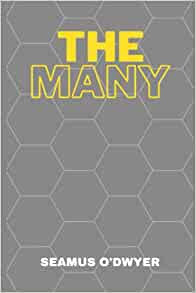
It is difficult for a young Many to conform and find their place within Nest and learn the tasks they must do. When caught up in the middle of human conflict it is all too easy for a single Many to become confused and stray from the group. A Many named Two lost in the confusion of conflict is forced to make difficult and dangerous choices as she tries to take her place with the adults who work to help humans prosper. Can she become one among many or set a path all her own, only she can decide.
July 16, 2022
Art - Amir Zand
July 12, 2022
Interview with Dr. Jeffrey A. Robinson
Interview with Dr. Jeffrey A. Robinson
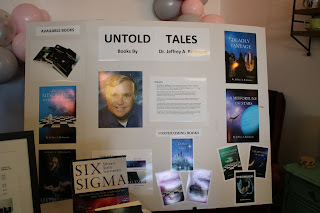
Q. I was recently listening to a podcast of your short story, Ripples in Time . There’s a mention of a city that appeared as a mirage during the 1930s and the description was so believable that I found myself searching the web to see if it were true. How did you come up with that?
A: Well, I have a physics background and I juxtaposed a picture of a mirage with the memory that once, long ago, the great plains were under water. A fleeting idea occurred to me that mirages could be looking back to those times. Then I thought of turning it into a love story. The rest of the story just fell in place. That’s the way stories develop… from random ideas and strange questions that often start out with “what if?”
It's strange. The idea of the city came to me when I heard about distant mirages at sea. So… I just made up the story about a newspaper article years ago that recounted such an event.
It’s funny, I typically add fictional details to my stories and try to make them sound real... but sometimes I get people asking if that drug is real, or if that piece of science is true, or if a fictional historic event actually occurred.
I like to make my stories seem realistic and I guess it’s a compliment when people can’t tell where reality stops and the fiction begins.
Q. So this takes us nicely in to your rather successful Untold Tales podcast. You’re up to 72 stories now. How did it all start?
A: I had just published three short story anthologies when I met Melissa Del Toro, a voice-over specialist at a writer’s workshop. She was explaining how written books can be turned into audiobooks. After her presentation, I spoke to her and said that my biggest problem with audiobooks is that they take so long to listen to. (I read a lot and I also read much faster than a normal speaking pace) I explained that it typically took many sittings to work my way through an audiobook of any appreciable length… often 8 or 9 hours. I said that it was sad that no one converted short stories to audio format and suggested that such short audio stories could be listened to in a single sitting… such as while commuting to or from work, or at lunch. Thus, the idea of audio anthologies was born. Such collections of audio shorts could be targeted for people who don’t have enough time to listen to long audio recordings…. People who don’t want to stop listening when only partially finished. We envisioned that such a collection would be ideal for commuters going to and from work. And we thought of calling it TALES FOR TRAVELERS. However, we stuck with the title UNTOLD TALES since that was the name of my science fiction anthologies.

Q. So you met Melissa Del Toro Schaffner at a writing group?
A: Yes, as I mentioned we met and immediately started brainstorming about collections of audio short stories. We decided to start with the science fiction short stories that I had just published, but we’ve always planned to expand to other genres. When we get a larger listenership we plan to offer other podcast playlists for stories other than science fiction. They could be called CRIME FOR COMMUTERS, MURDER FOR THE METRO, DRAMA FOR THE DRIVE HOME, HORROR FOR THE HIGHWAY and more. We hope to kick off some new genres soon.
Q. One of the attractions of the podcast is that the stories are science fiction of a ‘high quality.’ How do you decide what qualifies as high quality and what doesn’t?
A: Well, I fell in love with Science Fiction at an early age. My father was a nuclear physicist and he got me reading books that his father had started. I grew up reading Edgar Rice Burroughs and JOHN CARTER OF MARS, H.G. Wells, horror from the 20’s and 30’s H.P. Lovecraft, Clark Ashton Smith, writers from the GOLDEN AGE, Asimov, Clark, Bradbury, Sturgeon, Simak, Doc E.E. Smith, and so many more. I tend to compare new books that I read to those classics. The other advantage that I have is that I was privileged to work with a friend who edited and published one of the early e-zines on the web. As co-editor, I had the unfortunate task to read through unpublished submissions that we received. We called the backlog the ‘slush pile’ because 95% of the stories we got were so terribly bad. It is ironic how reading very bad stories makes you really appreciate the very rare good ones.
Ultimately, only about 5% of the books you buy or read are worth the cost of the book or the time that you invest in reading it. Often, you work your way to the end, feeling in your heart that it will get better, but it doesn’t. I try to write stories that I would like to read and that I would consider to be in that 5%.
Q. What are the essential elements to a good science fiction story?
A: Ah… many authors think the focus of good science fiction is the quality of the science. It is not. Science is really not that important to a good SF story. Science should be an excuse for a novel setting or situation. A really good science fiction story is ultimately just a good story… a who-dun-it, or a romance, a mystery, comedy or tragedy. Science should take a back seat to the story, the characters, and the plot. Science is really the backdrop, the surrounding scenery, window dressing. If the focus is on the science, how a blaster works or how a stardrive functions, then you often have characters that are flat and uninteresting, plots that don’t make sense or that go nowhere and writing that is bland and colorless. Indeed, I have written good science fiction that is in the Victorian setting as well as the far future and the heart of a good science fiction story is just that… a good story, one that is well written and has interesting characters that you identify with and care about, people who are doing interesting things in interesting situations.
Q. As well as an author of short stories, you’ve also written a few novels, some of which are grouped into trilogies. How about picking one and introducing it to us?
A: One trilogy, that is waiting for the third book to be finished is called MINDGAMES and is based on the premise that two researchers discover a drug that has a strange effect on a very small segment of the population. These people have a genetic defect that makes them hear voices. But there is medication they can take to treat that problem. Anyway, when those people take this new drug, they become telepaths… fully functional telepaths who can hear other people’s thoughts. It seems that they people were ‘latent’ telepaths and the voices that they sometimes heard were really ‘other’ people’s voices, or rather thoughts. These people have only one gene, a recessive, that partially enables telepathic abilities in their brain and when they take the drug it is like having that missing second gene and they become fully telepathic. The story basically addresses a specific problem. What would the government do if they had a drug that could turn one in 10,000 people into a telepath? and if they were the only people who knew about the drug? It is a story about power and potential, good and evil, and how such abilities would affect people. It weaves ancient myth and modern science and reveals that telepaths have always been among us, but have hidden themselves because over centuries they were killed as sorcerers or burned as witches when their powers were discovered. There is romance, horror, intrigue and drama.
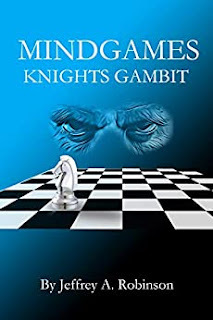
The first book KNIGHT’S GAMBIT is about the discovery of the drug. The second book is called QUEEN SACRIFICE and is about conflict between the few remaining telepathic groups that have been hidden for centuries. And the third book CHECKMATE is about the conflict between world governments and these new telepaths. I like to think it is comparable to the Saga of Pliocene Exile and The Galactic Milieu Series by Julian May.
I have another completed trilogy that is a classic ‘space opera’ and a third that is partially written but most of my novels are standalone and almost all of them started with the question… “what if?”
Q. You’re a doctor of science and I’ve been looking up your qualifications (Ph.D, MBA, BA, BSEE, MBB, PMP). Also your career experience with computer programming and automation. How much do you think knowing your stuff helps with the creation of a science fiction theme/idea?
A: Well, it sure helps with managing details about science and technology. You see there are two types primary types of science fiction. Hard and Soft. Hard SF is technically accurate (though we may wink at things like faster than light travel or large cheap sources of energy. Hard SF tries to be as realistic as you can be. Soft SF is of two types. One is in the sense that it deals with softer disciplines of science, like psychology, sociology, anthropology, and so on.
The other aspect of Soft-science is where science is not treated realistically or where basic laws of physics are simply not applied. Things like, I bumped my computer, it became aware and took over the world. Or, using common household chemicals I developed a drug that made me super intelligent and immortal. Or you forget about things like inertia, mass, or gravity and end up doing things like walking on the surface of the sun. For those who have even an inkling of understanding of science, such things are as offensive as stating that 2 plus 2 is 22.
Q. You also flew F-4 Phantom Jets. What can you tell us about that? (Or is this classified?!)
A: Oh…well. When I went to college, the Vietnam war was still raging. Many of my classmates were drafted right out of college and spent the next couple years in foxholes in distant jungles. I had a very low draft number and would have been drafted, so I joined the Marines and qualified for their pilot training program. I got my private license and after college went into the marines. Fortunately, the month that I got my wings, the US pulled out of Vietnam. I never served in combat and count myself lucky in several ways. But I did have a few incredible experiences, like walking away from a plane crash, and flying at Mach 2 fifty feet above the surface of the Arizona desert. I later served as an air traffic controller too. It was…amazing.
But I have had a lot of other experiences too. I have been a short-order cook, a cartoonist, a business manager for a small weekly paper, a marathoner, a scuba diver, and more. My background is rather… eclectic.
Q. You’ve said already that you grew up loving to read sci-fi. What were your old favourites?
A: The Lensman by Doc E.E. Smith. Anything by Issac Asimov, Arthur C Clark, or Ray Bradbury. Later I fell in love with dozens of authors in other genres, Michael Moorcock, the English author who wrote the Eternal Champion series. Robert Heinlein, of course. And I have fallen in love with others along the way, David Gemmel, Marion Zimmer Bradley, Pohl Anderson, Ben Bova, comedy by Terry Prachett, mysteries by Lee Child. I sit in a room filled with 15,000 books. That’s a book a day, every day, for 40 years. My list of favorites would sadly be many pages long.
Q. Is it true that you read one book a day?
A: Yes … I have read one (or more) books a day for nearly 40 years (though I am down to one a week now because I am writing so much).
Consider a typical paperback book that is about 120 pages long. If you open the book to any random page, you can probably read a single page out loud in about a minute. True, you would probably be reciting words as fast as you can, but it would still only take about a minute to read one page out loud. Therefore, if you could keep up that pace, you should be able to read the average paperback book, out loud in about 120 minutes or two hours.
First you have to build up the endurance to sit in one place and focus sufficient attention that you can read or an hour or two a day. When you do that, your reading speed, comprehension and attention will all eventually improve as well. Then, in the time that you would have spent watching a single TV movie each night, you can read a book instead.
Q. Having read so many books, it must put you in a unique position in terms of coming up with something original. That is, you’re more likely to know if an idea you have has been done before. Does this help or hinder your writing?
A: Yes … original is hard, but sometimes I borrow pieces from other stories but add a new twist that I think is interesting. (For example: One Last Time, Where All The Roads End, and Collaboration)
I do get some original ideas (for example Ripples in Time), but some topics are so overdone that it is almost impossible to do something new – but I try, for example The Timepiece).
Q. Being an avid reader as well as a writer, how much do you in turn think of the reader when you are creating and editing a story?
A: Constantly… is the pace too fast or too slow? Is the sentence structure varied enough so that it does not get boring? How much should I explain and how much needs to be revealed slowly? It is ultimately ALL about the reader. If a writer does not constantly think about the reader he is likely just a self-centered egotist writing to himself to themself.
A true storyteller respects and identifies with his audience. The best storytellers are lucky because they get actual eye-contact with their audience.
You see… I am also a reader and I want to write stories that I would like to read. As a writer I am trying to paint a picture with words, just like every artist who has to figure out what colors to use to make the viewer see the picture properly. In the same way, I have to find the right words to convey that image that I see. If they don’t see or hear or experience what I meant… then I used the wrong words or the wrong ‘colors.’
Q. Okay, and as a final question, what are you working on at the moment? Any new stories or novels in the works?
A: Well, I am continuing to work on the podcasts, of course. We just published episode 72. We are in our third year and we have a major release coming at the end of the year that will include re-airing all our podcasts as YouTube videos as well as creating a new website, facebook pages, and a writer’s blog. We have a total of 111 short stories in the pipeline for our podcasts and we haven’t opened up the other genre playlists yet (mystery, crime, drama, horror, or military-SF) I have written nearly two dozen short stories in the past two years… about one per month and have also published 7 novels in that time. I currently have two more anthologies already completed and they will launch at the end of the year, and… if possible… two more novels, as well. Ideas are not my problem. My problem is that I have too many stories and not enough time. Note… I also have seven grandchildren who are competing for my time and attention and a wife who tolerates my eccentricities remarkably well. I couldn’t do any of this stuff without her.
It’s funny. I worked as a technologist for 40 years while teaching graduate school for 30 of those years. I’m supposed to be retired, but I feel busier than ever.
Thanks very much for the interview, Jeff.
You can check out the Untold Tales Podcast here .
Also you can find Jeffrey’s website here ,
connect with him on goodreads here
and his amazon page is here .
July 6, 2022
Dating

Dating
by Chris Morton
This one was all right. Short dress. Ruby red lipstick. But she was taking out her phone already.
“You don’t hang about, do you?”
She was chewing gum, fast and swiping away. She pointed her phone at mine, then screwed up her face, confused for a moment.
“You not gonna turn it on, then?”
“And what if I don’t?”
She screwed up her face some more. There was a mole on her right cheek that I was finding strangely attractive. “Listen,” I said. “How about we get to know each other first?”
She was looking around the bar. Still holding her phone, she held it high above her head. She pressed on it and I didn’t need to know which APP she was on because that’s what the story is about, you see. The damned MATCH APP.
Her phone lit up.
“Listen, bud,” she said. “I just been paired with three guys in this bar.” She was looking at me in the eye. I have blue eyes, did I mention that? Before this APP came along, these blue eyes were all I needed.
She was chewing her gum slowly. Chewing her gum and looking at me. “I like you.” She was scanning me up and down. “You’re fit. A hottie. Something this place is definitely lacking.”
“You’re pretty damned fine looking yourself.”
She laughed and it wasn’t altogether unpleasant. Sure, maybe a little too loud, a little too rough, and there was just a touch of falseness. But this girl had spirit. She was my type. Energy. A bit of gusto. She had a tattoo on her shoulder of a thin red dragon. Her skin was tanned, and she was large in all the right areas.
She was watching me.
“Say, you got something to hide, mister?”
“Nah, you don’t need to worry about that. I’m clean. An upright standing citizen.” I was wearing a t-shirt and showed her my arms. “You ever see a junkie with skin as smooth as a baby’s behind?”
She laughed again, this time a little more gently. She placed her phone onto the glass table between us; next to her drink and mine – neither which we had touched.
“Been sat here five seconds,” I said. “Don’t you wanna get acquainted?”
She reached out a hand and placed it on the back of my own. Then the other one too, and I was staring at her mascara. I was thinking all sorts of things you probably don’t want to know about.
And what the hell? Maybe this time it would be different. We’d be the perfect match. There’d be no going back. She’d be mine tonight and later we’d have six kids and a subsidy from the city government. We’d get a house out by the coast.
Leaning forward, she gave me a peck on the nose. “Thing is,” she said. “I been there already. I’ve had my fun.”
Her eyes shifted to the left and she smiled, remembering a whole lot of fun that was none of my business.
“But I’m ready,” she said. “I wanna slow down.”
“Yeah, yeah, I get it,” I replied, seeing that this was going nowhere. “No more wasting your time with Mr Wrong.”
I lifted my hands from under hers and reached for the phone in my pocket. I turned it on and selected the MATCH APP (the official name of which it pains me to mention).
She was shifting in her seat. All but wetting herself in anticipation.
“And how can you trust this thing, anyway?” I said, my finger hovered over the select button.
“Would you just get on with it?”
“Now hear me out a minute. Cos there’s something you should know. You see, this APP,” I told her, “it doesn’t like me much. Seems to think I’m some kind of a jerk.”
She went for her drink and shot me the kind of look that said it was time to stop talking.
“Oh, come on! This is you and me, Baby! Sat here like it was before this thing was ever invented – two people, a guy and a girl. And I like you, I like the look of you. Forget about the technology.”
“Mister, I’ll give you five seconds.”
“What you tell it? Your favourite colour? Your favourite food? Or maybe what kind of music you like listening to on a hot summer’s night? What’s your ideal vacation, Baby? Where’d you go? What’d you –”
“It’s more than that,” she cut in, putting down her drink. Her eyes were on my finger, on my phone and hers. “It’s science.”
“Oh, yeah, science,” I scoffed.
“You give it your blood type. And DNA,” she said, enunciating each letter.
“Hey, if it’s DNA you want, Baby, I’ve got plenty of it.”
“Ha, ha,” she replied slowly, eyes narrowing.
She leaned back in her seat.
“You a scientist?” I asked.
“Maybe I am and you’ll never know it.”
She made as if to stand up, made as if to leave, but she had me and she knew it.
I had to know.
“Wait.”
“Oh, yeah?” She frowned, pursing her lips.
“Okay, Baby. Have it your way.”
Reluctantly, I pressed down on the button.
The application whirled, coming to life in a swirl of orange.
“PLEASE WAIT,” said the message.
She was looking at her phone and I was looking at her body. At her soft pink hair and the soft down on her upper lip.
The application turned to red.
“NO MATCH.”
“Well ain’t that just great,” I said, throwing my phone back onto the table.
She already had her bag around her shoulder. She’d taken a compact and was adjusting the blush on her cheeks. “Don’t take it so hard,” she said. “I’m sure there’s someone here for you.”
She leaned forward and kissed me again, smelling of all things female and it was torture, I tell you. She ruffled at my hair – did I mention I have good hair? I’m a natural blond. The girls, they used to love that.
“This thing, it’s just a fad, you know that, don’t you? A year from now …”
But I was wasting my breath.
She was now waltzing over to a group of guys at the bar. As she got closer, they all pulled out their phones – and I swear they did so in unison. It was shameful to watch, but one of them got lucky.
“Hey, I hope you’re happy!” I shouted.
But that was it. No need to create a scene.
Lazily I took up my phone and held it high above my head.
The same swirl of orange followed by the red NO MATCH.
“Not a girl in this entire place …”
Goddamn APP.
The guy she was talking to had an Armani suit – the genuine article; this fellow had money and I wondered for a moment if he were cheating the system.
They say that if you’ve a high enough credit status, there are ways …
“Wanker,” I mumbled.
He had blotched cheeks and a balding hairline.
“Girl like that …”
It was nothing short of a travesty.
July 2, 2022
Bookspot - Incursion by Scott Carruba
Bookspot - Incursion by Scott Carruba
The lastest hi-tech virtual reality game is on the market, and customers are lining up for the chance to play. But not everyone who enters comes out alive.
An exciting new cyberpunk thriller that offers a gripping read.
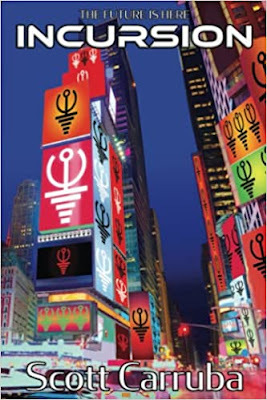
The future is here! Look everywhere. You’ve seen the symbol, the sign of things to come. The enigmatic gaming corporation Five Cube sprang from nowhere, promising unparalleled entertainment. This new experience will change your life … forever. Evan and his online friends mistrust the claims, and people are going missing. What is truly promised? Is it worth the risk to dive in so deeply? There’s only one way for them to find out.


